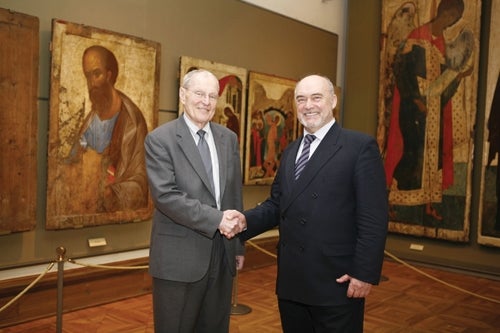Gordon Lankton, founder of the Museum of Russian Icons and the man who transformed Clinton manufacturer Nylon Products into a billion-dollar, employee-owned company, died on Sunday at the age of 89.
Lankton leaves behind a storied legacy as an investor in his community, innovative leader and storied collector.
“Gordon was a natural-born leader,” said the Museum of Russian Icons’ executive director, Kent dur Russell, in a statement. “He was infectiously enthusiastic, a pragmatic visionary, and an inspiration to his community and to the over 20,000 employees of his plastics company Nypro, Inc.”
Born in Illinois in 1931, Lankton graduated from Cornell University with a degree in mechanical engineering in 1954. President of the school’s student government, Lankton traveled as a delegate to an international student council conference in Japan, a trip believed to have sparked his love for adventures abroad, according to the museum.
From there, Lankton served as part of U.S. Army Military Intelligence in Frankfurt, Germany from 1954 to 1956, after which he embarked on a nine-month motorcycle trip spanning from Germany to Japan. He wrote about his travels in his book “The Long Way Home” in which he remarked, “If a single theme has come out of my nine-month experience, it was somehow I have to focus my life on minimizing the enormous disparity of living conditions in the world.”
When he returned to the United States, Lankton joined DuPont in Delaware as a plastics technologist, later recruited to be general manager of the plastics division at Stanley Tools in New Britain, Conn. In 1962, according to the museum, at the age of 30, he placed an ad in the Wall Street Journal looking for a small, custom plastics injection molding company. This resulted in his connecting with and investing in Nylon Products in Clinton, which he would later go on to own and rename Nypro Inc., overseeing its growth into a billion-dollar company.
Along the way, he married his wife Janet Kilby, who also attended Cornell, in 1958, according to a family obituary.
Under Lankton’s ownership, Nypro expanded to include 24 companies across the United States, as well as operations in Puerto Rico, Mexico, Ireland, France, Hungary, Russia, Denmark, China,India, Singapore, Thailand, Korea, Taiwan, Hong Kong and Japan.
In 1998, Lankton converted Nypro into an employee-owned company, which those around him cast as emblematic of his belief in the value of the individual. Dozens of employees went on to become millionaires as a result of holding equity in the company.
Lankton was inducted into the Plastics Hall of Fame in 2000 and into the Manufacturing Hall of Fame in 2009. He was previously named Business Leader of the Year by WBJ and honored as International Businessperson of the Year by the Society of Plastics Industry and the Society of Plastics Engineers. He received an honorary doctorate from Worcester Polytechnic Institute and, among other honors, the Pushkin Award from the Russian government in 2013.
When asked in 2016 what manufacturers in Central Massachusetts can do to excel, he said, “Stay ahead of the competition, and provide the best products and services that no one else does.”
In 2006, Lankton founded the Museum of Russian Icons in downtown Clinton. He was prompted to do so, according to the museum, after opening a Nypro branch in Moscow in 1992, at which point he developed a deep appreciation for Russian culture, and especially the icon, which has ties to the Byzantine traditions of the Russian Orthodox Christian faith.
“His enduring legacy will be his Museum of Russian Icons, which he founded to house his incomparable collection of Russian sacred art,” dur Russel said, in a statement.
Lankton is survived by his wife, as well as their three daughters.

